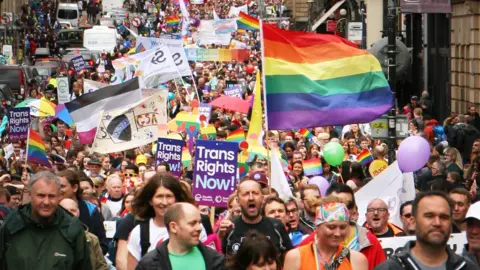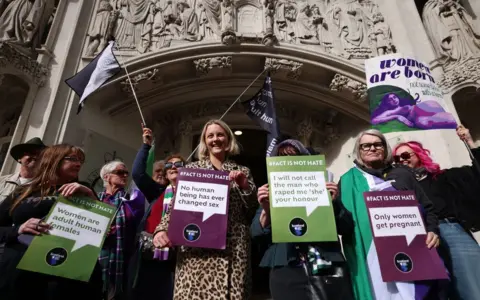Edinburgh Pride bans political parties from march
 Getty Images
Getty ImagesPride Edinburgh has banned political parties from this year's festival over a "lack of meaningful action" in response to the recent Supreme Court gender ruling.
Organisers said politicians had failed to speak out or protect transgender people after the UK's highest court said a woman was defined by biological sex under equality law.
They said this was not a ban in individuals, and politicians "who support the values of equality, visibility and justice" could still join the march in a personal capacity.
But parties will not be allowed to register for a space or host a stall at the city's annual LGBTQ+ march on 21 June, and politicians will be banned from making speeches.
It follows announcements earlier this week by Pride groups in Glasgow, Birmingham, Brighton, London and Manchester in a gesture of solidarity with the transgender community.
In a statement issued on their social media, Pride Edinburgh said: "The organising team is alarmed by the ongoing rollback of protections and support for the transgender community, driven by those in power across both the Scottish and UK governments and political parties.
"At its core, Pride exists to amplify community voices, empower individuals, and hold institutions accountable. Any move to silence or exclude undermines these very principles.
"We share the community's anger, grief and frustration."
The spokesperson added: "We stand in unwavering solidarity with our trans siblings. They deserve better."
Pride Edinburgh organisers said it was the first time in the festival's 30-year history that it had suspended political parties.
 EPA-EFE/REX/Shutterstock
EPA-EFE/REX/ShutterstockThe Supreme Court ruling marked the culmination of a long legal battle after the Scottish government argued that transgender women with a gender recognition certificate are entitled to the same sex-based protections as biological women.
The judges unanimously agreed with the campaign group For Women Scotland which argued that sex was defined by biology under the 2010 Equality Act.
While the ruling was welcomed by some campaigners representing lesbian, gay and bisexual people who said it protects single-sex groups, others shared concerns about the impact on the trans community.
Some UK organisations - including in sport and politics - have changed or updated their policies around single-sex teams and spaces such as toilets and changing rooms in response to the Supreme Court ruling.
An interim update from the Equality and Human Rights Commission (EHRC), which enforces equalities law and provides guidance to policymakers, has said access to such spaces must be based on biological sex.
Last week, the Scottish Parliament confirmed it would adhere to the Supreme Court ruling so toilets designated as male or female-only would now be interpreted as meaning biological sex.
This year's march in Edinburgh starts at the Scottish Parliament before heading up the Royal Mile and over George IV Bridge and ends at the University of Edinburgh.
Instead of speeches from MPs and MSPs, the march will begin with speeches from members of the Equality Network.
Politicians including Nicola Sturgeon, Sir Keir Starmer, Boris Johnson and Sir Ed Davey have previously attended Pride marches throughout the UK.
